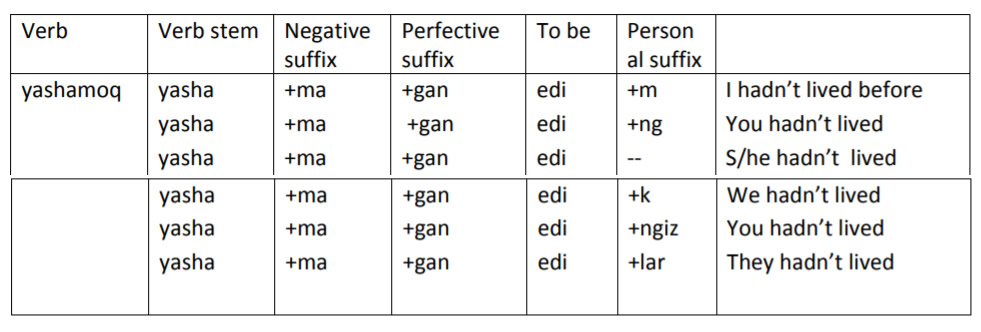Difference between revisions of "Language/Northern-uzbek/Grammar/Past-Perfect-Tense"
< Language | Northern-uzbek | Grammar
Jump to navigation
Jump to search
m (Quick edit) |
|||
| Line 37: | Line 37: | ||
==Sources== | ==Sources== | ||
https://slaviccenters.duke.edu/sites/slaviccenters.duke.edu/files/file-attachments/uzbek.original.pdf | https://slaviccenters.duke.edu/sites/slaviccenters.duke.edu/files/file-attachments/uzbek.original.pdf | ||
==Related Lessons== | |||
* [[Language/Northern-uzbek/Grammar/Present-Continuous-Tense|Present Continuous Tense]] | |||
* [[Language/Northern-uzbek/Grammar/Negation|Negation]] | |||
* [[Language/Northern-uzbek/Grammar/The-verb-KELMOQ-–-to-come|The verb KELMOQ – to come]] | |||
* [[Language/Northern-uzbek/Grammar/Compound-verb|Compound verb]] | |||
* [[Language/Northern-uzbek/Grammar/Adjectives|Adjectives]] | |||
* [[Language/Northern-uzbek/Grammar/Postpositions|Postpositions]] | |||
* [[Language/Northern-uzbek/Grammar/Expressing-a-desire-fo-an-action|Expressing a desire fo an action]] | |||
* [[Language/Northern-uzbek/Grammar/Formal-and-informal-YOU|Formal and informal YOU]] | |||
* [[Language/Northern-uzbek/Grammar/Future-Tense|Future Tense]] | |||
* [[Language/Northern-uzbek/Grammar/Comparative-Adjectives|Comparative Adjectives]] | |||
Revision as of 13:45, 26 February 2023
Past Perfect Tense (Tugallangan o’tgan zamon).
This form is used when talking about completed action in a distant past, before the recent action took place. It is formed by adding edi – use to (that is the past participle), plus the possessive type of personal suffixes. The associated words with that tense are before – avval, oldin, ilgari.
For example:
- Men Fargo’onada bedana palovini yegan edim. Men Toshkentdan avval Gulistonda yashagan edim.
The negative is formed by adding to the verb stem the suffix -MA, plus the suffix -GAN, followed by the past ending edi plus the personal suffix
The negative may also be formed using the verb stem plus the suffix -GAN, followed by the negative copula emas, followed itself by the past copula edi plus the personal suffix.
- kelgan emas edim I hadn't come
- kelgan emas eding You hadn't come
- kelgan emas edi He/she/it hadn't come
- kelgan emas edik We hadn't come
- kelgan emas edingiz You hadn't come
- kelgan emas edilar / edi They hadn't come


